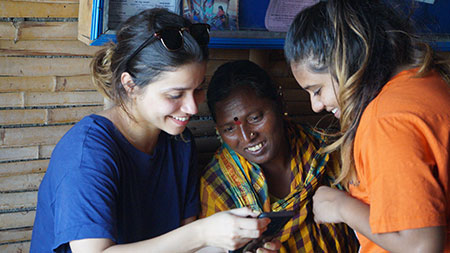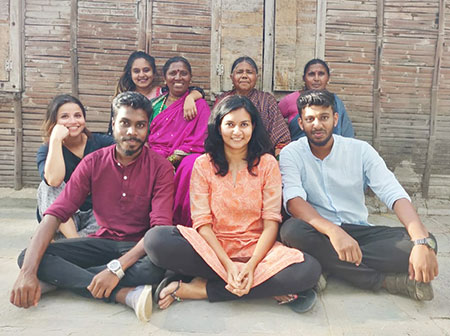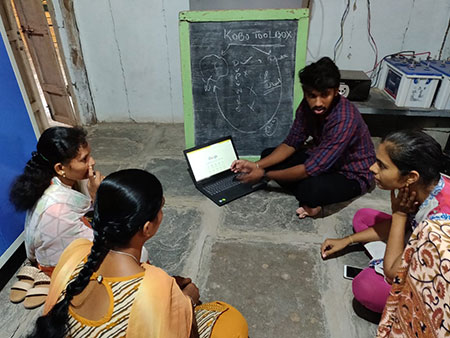At the Raichur-based Jagrutha Mahila Sanghatane, a Dalit women agricultural workers’ collective, data collection was done using pen and paper. This nonprofit organisation (NPO) sold terracotta jewellery at government exhibitions to raise funds for its social projects. When floods hit Raichur, the NPO lost ten years of granular-level data to the natural calamity and was unable to access donors or scale operations.
This struggle to survive and multiply social impact is a story playing out across India’s NPO landscape. Often, the NPO’s inability to scale arises from limited resource mobilisation, lack of access to donors, limited networking, and time inefficiencies.
Leveraging technology to scale
In 2018, Rinju Rajan, Akhila Somanath, and Anusha Meher Bhargava conceived of Tech4Good Community, an initiative to help small and remote NPOs access technology-based solutions to scale their operations.

“Having worked in this (NPO) sector for well over a decade, I came to believe that technology can be an enabler. Most of these organisations are unable to establish credibility, reach donors or even scale their operations,” says Bhargava, Co-founder & Chief Insights Officer of Tech4Good Community.
Tech4Good Community wants NPOs to adopt and implement technology on their own. The organisation furthers its vision by:
- Creating awareness around nonprofit-friendly tools
- Improving access to technology and software companies to enable mentorship, product discounts, and overall tech solutions
- Building capacity within the NPOs to form a secondary cadre of trainers
- Improving the quality of services and reporting to beneficiaries, donors, etc.
For this, Tech4Good Community first identifies the needs and tech maturity of the NPO through a diagnostic tool that they have created. Then, the team partners with tech companies to organise workshops to address these specific needs and mentor participants on tech tools.
Take Jagrutha Mahila Sanghatane for instance. Tech4Good Community worked with the NPO to help it understand how technology could help scale operations, and also helped it set up a Management Information System (MIS) using Salesforce. The MIS helps Jagrutha Mahila Sanghatane keep all its data in one place, while keeping track of donors and beneficiaries. The Tech4Good Community team also started a crowdfunding campaign and helped the NPO raise funds for it’s Justice for Ambika campaign.

“Most NPOs are unaware of Salesforce Nonprofit Success Pack (NPSP). They have a perception that Salesforce is expensive and instead rely on Excel to collect data,” says Somanath.
Free and open source, the NPSP breaks down silos, turning Salesforce CRM into a Constituent Relationship Management system for nonprofits, which gives everyone a single, shared view of all constituents.
Tech4Good Community has also built partnerships with other technology companies to conduct workshops and enable NPO access to solutions such as MIS, fundraising platforms, payment gateways, programme management software, online data collection tools, and donor/beneficiary management systems. These solutions have helped NPOs react with agility during calamities and widen the social impact.
Using Salesforce at Tech4Good Community
As all three founders of Tech4Good Community come from a non-tech background, they themselves needed mentoring to be able to create NPO-focused tech solutions. Salesforce, for instance, conducted workshops for the Tech4Good Community team to help them understand the different features of the Salesforce platform and how to optimise it for the social sector. Also, the Tech4Good Community team uses Salesforce for its own outreach programmes.
“Salesforce has increased convenience for us as the platform lets you have all your data in one place, something most nonprofits struggle with,” says Somanath.
Tech4Good Community used Salesforce to create its own MIS and keeps track of its beneficiaries, stakeholders, engagements with nonprofits, corporate partners, and discounts, and donations received. According to Somanath, working with the Salesforce solution has helped the team with a single source of information, comprehensive reporting and dashboarding capabilities, streamlined beneficiary management, and process and workflow standardisation.
Responding to the pandemic
When the pandemic struck last year, the role of NPOs became more critical than ever. They engaged in relief work and provided food, healthcare, and transportation. Tech4Good Community understood that building digital capabilities was key to enhancing these relief efforts. They organised a rapid response programme which included ten workshops under a Salesforce-sponsored ‘Spotlight Series.’ In these workshops, NPOs got access to software and tools needed to manage their operations remotely. The topics covered included Interactive Voice Response (IVR) campaigns and workflow redefinition for maximum efficiency.

Salesforce employee volunteers mentored participants, and the company invited NPOs it was already associated with to participate in these workshops.
- Over 300 participants took part in these workshops, with 40% accessing Tech4Good Community support for mentorship, discounts, offer, etc.
- 58% of participants were COVID-19 frontliners
- Participant strength increased to 51 per session from 20 when Salesforce conducted the sessions
- Several NPOs such as Built Empathy, Dakshas, and Headstreams also applied for the Salesforce Nonprofit Success Pack licence
Tech4Good Community is working with 600 NPOs right now, and as it further expands its reach, it is building a holistic tool that aims to serve as a one-stop platform fulfilling all the needs of nonprofits.
Technology can be an excellent enabler for nonprofit organisations. Be it to enable networking, fundraising, customised communications, or streamlining operations, Salesforce Nonprofit Cloud can manage it all. And through the ‘Power of Us’ programme, Salesforce.org offers deep discounts to nonprofits on all Salesforce products.
Also Read:
Building Educational Equity in India – The Teach for India Story
The Time for Business to be a Platform for Change is Now



